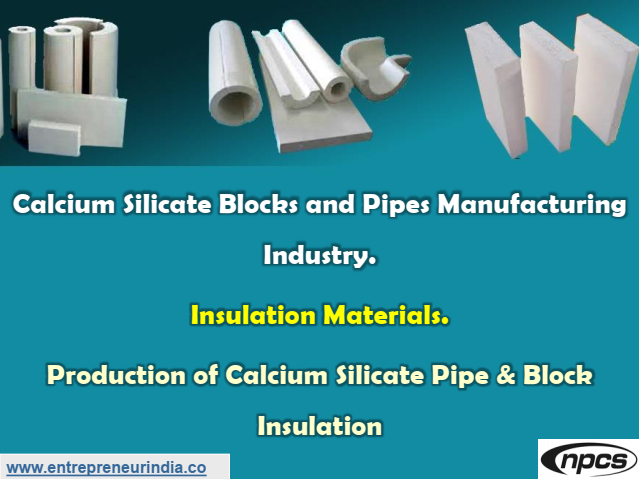
The Calcium Silicate Blocks and Pipes Manufacturing Industry is rapidly gaining momentum due to the increasing demand for heat-resistant and fireproof materials in construction and industrial applications. These blocks and pipes are used extensively in thermal insulation systems, especially in sectors like steel, power, cement, refineries, and chemical plants. With a growing emphasis on energy efficiency and fire safety regulations, businesses involved in the Calcium Silicate Blocks and Pipes Manufacturing Industry are witnessing rising demand from both domestic and international markets.
Industrial Applications and Market Demand
Calcium silicate blocks and pipes are inorganic, non-combustible, and lightweight materials with high thermal insulation properties. They are commonly used to line high-temperature equipment, insulate piping systems, and serve as fireproofing in buildings and industrial structures. As energy-intensive industries seek ways to conserve heat and reduce carbon emissions, the Calcium Silicate Blocks and Pipes Manufacturing Industry offers a sustainable and cost-effective solution.
The growing infrastructure development, rapid urbanization, and increased investment in power generation and oil refining sectors have boosted the demand for calcium silicate insulation. Global construction norms are evolving toward fire safety and thermal efficiency, giving this industry a significant edge.
Types of Products and Their Features
In the Calcium Silicate Blocks and Pipes Manufacturing Industry, two main products dominate the market: blocks and pre-formed pipe sections. These are used in different industrial and commercial applications depending on shape, size, and thermal rating.
Calcium silicate blocks are generally used for wall panels, fireproof enclosures, and duct insulation, while calcium silicate pipes are widely used for steam piping, hot water lines, and process equipment. These products are lightweight, durable, and resistant to chemicals, mold, and moisture. Their excellent compressive strength and dimensional stability make them ideal for high-stress environments.
Raw Materials Used in Manufacturing
The manufacturing process primarily involves the following raw materials:
-
Lime (Calcium Oxide)
-
Silica (Quartz Powder)
-
Reinforcing Fibers (typically cellulose or synthetic)
-
Alumina or other additives for heat resistance
-
Water and chemical additives for molding and curing
These materials are mix and reacted under control pressure and temperature to form the finish calcium silicate matrix. Their availability and cost efficiency make the business highly viable.
Manufacturing Process Overview
The Calcium Silicate Blocks and Pipes Manufacturing Industry follows a precise and standardized process that ensures strength and uniformity of the final products:
-
Mixing – Raw materials like silica, lime, and fibers are mixed with water to form a slurry.
-
Molding – The slurry is poured into block molds or pipe molds depending on the product.
-
Hydrothermal Reaction – Molds are autoclaved under high-pressure steam to initiate a chemical reaction that forms calcium silicate hydrate.
-
Drying – The solidified material is carefully dried to remove excess moisture.
-
Finishing – Blocks and pipes are cut to size, surface-finished, and sometimes coated for additional durability.
-
Packaging – Final products are packed for shipping, usually with moisture-resistant wrapping.
Automation can significantly improve consistency and productivity in the entire manufacturing process.
Machinery and Equipment Required
To start a unit in the Calcium Silicate Blocks and Pipes Manufacturing Industry, the following machinery and infrastructure are require:
-
Raw material mixers and slurry tanks
-
High-pressure autoclaves
-
Molding machines (for both blocks and pipes)
-
Dryers and finishing units
-
Cutting and shaping tools
-
Packaging lines
Advanced factories may include automated feeding, weighing, and batching systems, which improve efficiency and product quality.
Space and Infrastructure Needs
A medium-scale manufacturing unit requires:
-
5,000 to 10,000 sq. ft. of covered area
-
Ventilation and dust control systems
-
Separate zones for raw materials, production, curing, and packaging
-
Access to water, electricity, and boiler systems (for autoclaving)
-
Adequate safety provisions for high-pressure operations
The setup should comply with fire safety and building codes due to the nature of the products.
Licenses and Approvals
Before starting a business in the Calcium Silicate Blocks and Pipes Manufacturing Industry, entrepreneurs must acquire the following:
-
Factory License
-
Pollution Control Board NOC
-
Boiler Operation Clearance (for autoclaves)
-
FSSAI is not require, but ISO certifications are prefere
-
MSME or Udyam Registration
-
GST and Trade License
-
BIS/ISI Certification if supplying to public projects
Obtaining all legal and environmental clearances ensures compliance and better access to government tenders or export opportunities.
Investment and Profitability Insights
The investment to set up a manufacturing unit depends on the capacity and level of automation:
-
Small-scale unit: ?30–50 lakhs
-
Mid-scale unit: ?60 lakhs – ?1 crore
-
Large-scale automated plant: ?1.5 crore and above
Producers typically achieve gross profit margins ranging from 25% to 40%, depending on the product grade, operational efficiency, and distribution strategy. Long-term infrastructure and industrial growth continue to drive the market, enabling businesses to maintain sustainability and consistent demand.
End-User Industries and Client Base
The Calcium Silicate Blocks and Pipes Manufacturing Industry caters to a variety of sectors including:
-
Power Plants – For insulation in turbines, boilers, and piping
-
Oil Refineries and Petrochemicals – For high-temperature process systems
-
Steel and Metallurgy – To reduce energy loss in furnaces
-
Building Construction – For fire-resistant cladding and soundproofing
-
HVAC and Ducting Contractors – For thermal insulation in large commercial setups
Large engineering procurement contractors (EPCs), MEP contractors, and OEMs are frequent bulk buyers in this industry.
Market Trends and Growth Drivers
Recent trends show the Calcium Silicate Blocks and Pipes Manufacturing Industry expanding into newer applications such as:
-
Green building materials for eco-friendly construction
-
Customized insulation solutions for defense and aerospace
-
Anti-condensation solutions for cold storage units
Developing countries increasingly emphasize industrial energy efficiency, which drives global demand upward. Manufacturers and suppliers see significant export potential in the Middle East, Southeast Asia, and African markets.
Challenges and Risk Mitigation
Some challenges include:
-
Energy costs for autoclaving and drying
-
Competition from fiberglass and ceramic wool insulation
-
High setup cost for automated units
-
Need for consistent quality and mechanical strength
To mitigate these risks, manufacturers can invest in R&D, diversify their customer base, focus on customized solutions, and implement ISO 9001 or 14001 standards.
Conclusion
The Calcium Silicate Blocks and Pipes Manufacturing Industry is a promising venture for entrepreneurs aiming to serve the industrial insulation and fireproofing markets. With increasing demand from core sectors like energy, chemicals, and infrastructure, this industry offers strong profitability and long-term growth potential. By maintaining quality standards, adopting efficient processes, and targeting high-value clients, manufacturers can establish a competitive presence both domestically and internationally.
Niir Project Consultancy Services
An ISO 9001:2015 Company
106-E, Kamla Nagar, Opp. Spark Mall,
New Delhi-110007, India.
Email: npcs.ei@gmail.com , info@entrepreneurindia.co
Tel: +91-11-23843955, 23845654, 23845886, 8800733955
Mobile: +91-9811043595
Website: www.entrepreneurindia.co , www.niir.org





